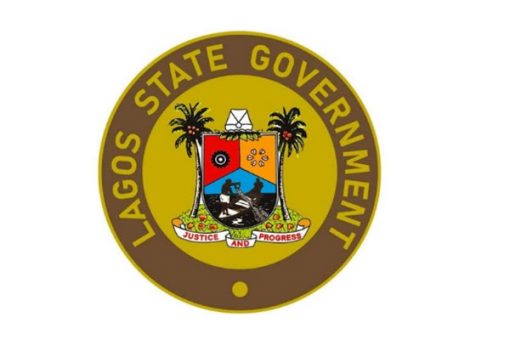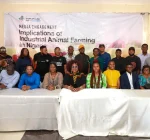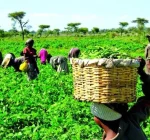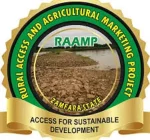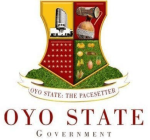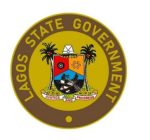Lagos strengthens private, public partnerships on agriculture
- 59 Views
- Agribusiness Africa
- October 14, 2025
- News & Analysis
The Lagos State Government has reaffirmed its commitment to advancing Public-Private Partnerships (PPP) as a key pillar for transforming the state’s agricultural and livestock sectors, positioning Lagos as a model for sustainable food systems in Nigeria.
According to the Commissioner for Agriculture and Food Systems, Ms. Abisola Olusanya, the initiative aims to deepen market linkages, strengthen agri-food supply systems, empower youth-led agribusinesses, and support community-based enterprises. She noted that recent agreements have been designed to enhance value chains, promote sustainable livestock production, support rice development, and encourage private sector investment in both agribusiness and rural livelihoods.
Ms. Olusanya emphasised that the PPP model has become a vital catalyst for driving innovation, mobilising investments, and improving service delivery. “Through these partnerships, we are building a more inclusive, resilient, and commercially viable agriculture sector that benefits our farmers and communities,” she said.
She highlighted Lagos’ strong record of collaboration with private investors, noting that the government continues to provide infrastructure while the private sector drives production in both the crops and livestock segments. This model of shared responsibility and investment, she explained, underpins the state’s ongoing transformation.
At the core of Lagos’ agricultural reform is the Food Systems Transformation Agenda, structured around a “three-tiered agro-marketing strategy” comprising the Lagos Central Food Security Systems and Logistics Hub in Epe, Mid-Level Agro-Produce Hubs, and Last-Mile Food Distribution Outlets. The agenda is designed to make food more affordable, reduce post-harvest losses, and create jobs.
Construction of these hubs is in progress, with Phase 1 of the Central Hub at Ketu-Ereyun, Epe, nearing completion. Additional hubs at Abijo (Ibeju-Lekki) and Dairy Farm (Agege) are expected to be ready before year-end, while new locations in Opebi, Bombata, Ikorodu, Lekki, and Festac are under development for future expansion.
To sustain food production, the government introduced the ‘Produce for Lagos’ initiative, backed by a ₦500 billion Guarantee Offtake Fund to secure supplies from both local and out-of-state producers. Ms. Olusanya noted that this approach gives farmers the confidence to produce without fear of price volatility.
The Lagos Rice Mill in Imota, with an annual capacity of 2.5 million 50kg bags, has empowered over 500 rice farmers, created 2,000 jobs, and cultivated over 1,500 hectares of paddy fields. Similarly, the Eko Agro Mechanisation Programme (EKO AGROMECS) leverages a digital platform to connect smallholder farmers with machinery on demand — cultivating over 3,000 hectares and supporting more than 500 farmers.
Youth inclusion remains a core priority. Through the Lagos Agripreneurship Programme (LAP), more than 4,400 young people and women have been trained, with 2,000 beneficiaries receiving inputs and start-up support. In schools, the Lagos Agric Scholars Programme (LASP) introduces students to hydroponics and aquaponics via Smart Agri Pyramid Systems (SAPs), with 12 demonstration centres established across the state.
In the livestock sector, Lagos is advancing food safety and protein security through its 750-hectare Cattle Feedlot Project in Igbodu, Epe — projected to produce over 100,000 cattle annually under hygienic, traceable conditions. Likewise, the Lagos Aquaculture Centre of Excellence (LACE) in Igbonla, Epe, launched in May 2025, is expected to yield 50 million fingerlings, 2,000 tonnes of table fish, 20,000 tonnes of processed fish, and 24,000 tonnes of aquafeed yearly.
Ms. Olusanya reiterated that Lagos’ agricultural vision is anchored on technology, inclusion, and sustainability, reaffirming the state’s determination to make Lagos a leading model of agricultural transformation in Africa.
Source: The Nation
Expert Review for Agri-Food Stakeholders
Lagos State’s renewed commitment to Public-Private Partnerships (PPP) in agriculture reflects a strategic shift toward system-wide transformation — one that blends policy, infrastructure, and innovation to strengthen food systems and private investment in the state.
- Institutionalising PPP as a growth engine:
The Lagos model positions PPPs as the backbone of agricultural modernization, driving efficiency through shared investment and accountability between government and private sector players. This creates an enabling environment where policy meets profitability. - Building market linkages through infrastructure:
Projects like the Central Food Security Systems and Logistics Hub in Epe and Mid-Level Agro-Produce Hubs represent a physical commitment to improving market access, storage, and logistics — three core challenges in Nigeria’s food supply chain. - Guarantee Offtake Fund as a confidence booster:
The ₦500 billion Guarantee Offtake Fund under the Produce for Lagos initiative signals policy-backed assurance to farmers and agripreneurs. This mechanism reduces market risk, stabilises prices, and encourages higher production across food value chains. - Youth and innovation as accelerators of change:
Through programmes like LAP, LASP, and EKO AGROMECS, Lagos is redefining youth inclusion — moving beyond training to asset support, access to technology, and enterprise development. This practical empowerment model could serve as a national benchmark. - Expanding protein and aquaculture capacity:
From the 750-hectare Cattle Feedlot Project to the Lagos Aquaculture Centre of Excellence, Lagos is aligning livestock and fish production with urban consumption trends — ensuring traceability, safety, and sustained supply for a growing population. - The PPP-driven sustainability blueprint:
By integrating private capital with public infrastructure and governance, Lagos is engineering a resilient food ecosystem that can scale regionally. The model demonstrates that sustainable food systems emerge not from subsidies but from shared value partnerships.
Conclusion:
Lagos State is setting a precedent for urban agriculture transformation in Africa. Its PPP-driven approach connects policy intent with commercial execution — bridging government vision with private capacity. If maintained, this momentum could position Lagos as West Africa’s agri-food innovation capital.
- #AbisolaOlusanya
- #AgribusinessAfrica
- #AgriFoodSystems
- #AgriInnovation
- #AgriInvestment
- #Aquaculture
- #EKOAGROMECS
- #FoodSystemsTransformation
- #ImotaRiceMill
- #LACE
- #LagosAgriculture
- #LagosState
- #LivestockDevelopment
- #MechanisedFarming
- #PPPModel
- #PublicPrivatePartnership
- #SustainableFarming
- #YouthInAgriculture
- FoodSecurity

